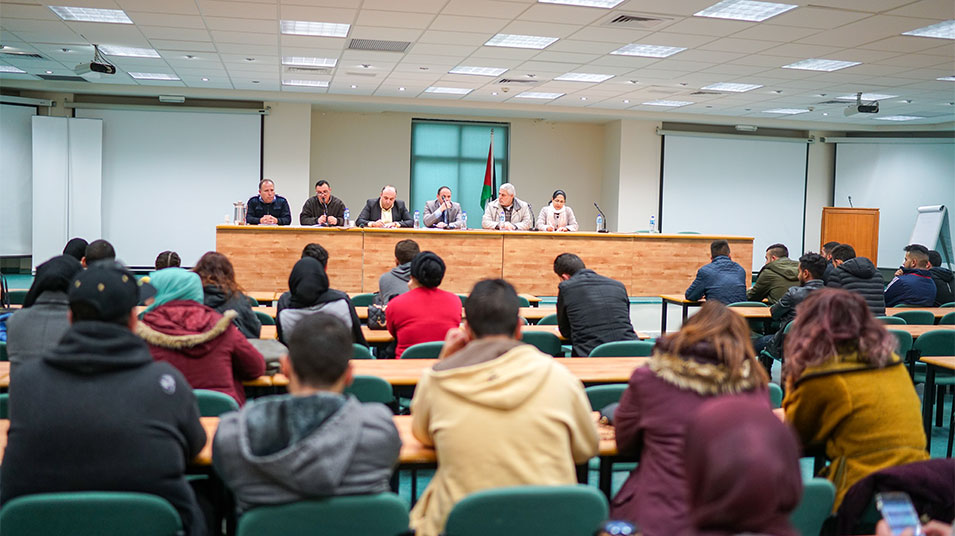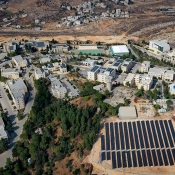Workshop explores implementation and effects of new anti-drug law
The Department of Psychological and Social Counselling in the Deanship of Student affairs at Birzeit University, in cooperation with Al-Sadiq Al-Taieb Association, organized a workshop exploring the new drug prohibition law (Law by Decree No. 18 of 2015).
The workshop, held on December 13, 2017, comes as part of an initiative to raise awareness on the anti-drug law and to explore how the new law would be enacted and what its expected effects could be. The initiative hosts representatives from the police, the Public Prosecution, and the judiciary system.
The Director of Al-Sadiq Al-Taieb Association, Majed A'loosh, noted that, while the new law is proving effective, the drug abuse problem can only be solved through the cooperation of everyone in the community, whether private citizens, law enforcement officials, or public and private institutions.
The Coordinator and Training Officer for the initiative at Al-Sadiq Al-Taieb Association, Afeef Rabee’, said, “This initiative is based on numerous workshops and field studies done within the context of the broader Palestinian community. Our aim is to raise awareness on the joint effort of the pertinent agencies. Drug abuse is a problem that affects everyone, and we should all put our hands together in fighting this epidemic.”
The Head of the Anti-Narcotics Department for the Ramallah and Al-Bireh Governorate in the Palestinian Civil Police Force, Lutfi Ishtayeh, detailed the procedure that the police forces use when given a tip on narcotics usage or trade: “Our society is a conservative one; any rumors or claims of drug use are scrutinized and usually lead to the ostracization of the alleged suspect by the society. As such, we exercise caution and tactfulness when dealing with such claims. We fact-check any tip or intel that points us towards the location of possible illicit drug trade or usage.”
“We are,” added Ishtayeh, “a law enforcement agency; that is, we do not judge or sentence suspects. We only arrest them per the law and standard procedures. Before entering a suspect’s house, in which alleged drug trafficking or usage are taking place, we file a formal search warrant request to the Public Prosecution. After the Prosecution duly reviews the search warrant claim, we are granted a search warrant and we move to the suspected location, searching it as per the standards and procedures, with the owner present. Upon concluding our search and investigations, we file the pertinent paperwork and transfer the case to the Public Prosecution.”
The Director of Public Prosecution, Lo’ay Shamieh, elaborated on the process in which they process and present to the court any illicit drug cases transferred over from the Police force, “While this is a joint effort in which the three entities – police, Public Prosecution, and courts – take part, there is a system of checks and balances that monitors and regulates the influence of each of these institutions on the criminal procedure.”
“When the police forces file a search warrant request as part of an ongoing investigation, it should adhere to the probable cause principle, and if possible, should provide all the evidence pertinent to the case, i.e., evidence that led police to pursue that search warrant,” Shamieh further said.
Court of Conciliation member Justice Ahmad Hasan highlighted the provisions of the new law and their effectiveness in curbing the drug abuse problem in Palestine: “Before the Law by Decree No. 18 of 2015 was issued, we used to rule as per the Israeli military orders and the Jordanian laws, which were ineffective and mostly insufficient; the suspect would be sentenced to 3-6 months of jail time. The new law, however, is more stringent on recurrent offenders, and yet leans away from punitive measures and more toward rehab.”
Justice Hasan further noted, “The law protects the individual’s right to return to society by lifting punitive measures on first-time offenders and those who turn themselves in while protecting the society by introducing harsher sentences to repeat offenders and drug dealers.”







